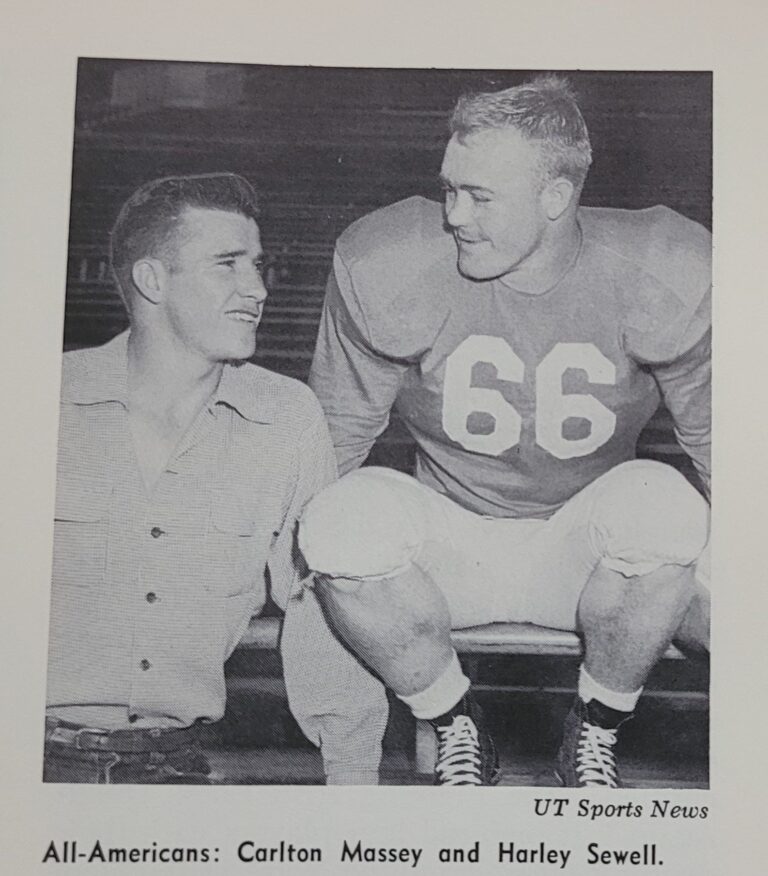DKR and Country Music
DKR WAS AFRAID OF PUBLIC SPEAKING
Once while an assistant coach at North Carolina State, he completely forgot his speech at a banquet. Royal said, “I got up to talk and drew a complete blank. If you’ve never had this happen to you, you don’t know how frightful it is and how painful it is …… I finally just said I am sorry and sat down.” After this embarrassing episode, DKR said to himself, “if I am going to stay In coaching, I have to whip this thing (Fear Of Public Speaking) or get out and try something else.”
THE ORIGIN OF ROYALISMS
Royalisms have their roots in country music and in his hometown of Hollis, Oklahoma. As a boy, Royal survived a tenuous family life during one of the worst economic periods in American history. During these years, he took solace in the radio, listening to Bob Wills, The Chuck Wagon gang, Jimmie Rodgers, and the Lucky Strike Hit Parade. The words to the songs taught him important life lessons he held onto like a life preserver in stormy seas.
Royal was fascinated by a songwriter’s ability to tell colorful stories in a 2-minute song. He knew from the content of the songs that the songwriters wrote from experience and were “part of this world”.
He once said, ” I’ve stolen and copied ways of expressing myself from songwriters”. Royal learned from Country music how to make poignant visual points in a sentence.
DKR learned while at Texas that the press “didn’t want a long, drawn-out explanation”. He said “they wanted something they could write, and they couldn’t write a book.”
” Once Royal understood what the press wanted he started making insightful, short, penetrating, and visual comments just like country-western singers. Someone tagged these comments as Royalisms and the name stuck. Here is a sample of DKR using his “songwriter” skills to deliver his message to the press in a quotable form.
Coach Royal says of James Saxton “He’s the quickest football player I’ve seen. He gives you a thrill on a two-yard gain.
He is like a balloon full of air. When you turn him loose, there’s no telling where he’s going and when the play is over, he’s spent”.
However, none of the Royalisms would have occurred without the ability to speak in public. Enter Bill Alexander a consummate speaker who helped Coach Royal overcome his fear of public speaking. Bill told Royal to memorize The Bridge Builder by Will Allen Dromgoole and learn to tell it like a story and not a poem. Go to the 5:45 mark “Tribute to Darrell K. Royal” link to hear Coach Royal recite the poem.
Coach Royal did as instructed and learned a valuable lesson in the process. You can’t imitate someone’s speaking style or their mannerisms without coming across as phony, so he decided just to be himself at speaking engagements. He commented, “I think that if you’re sincere, even in a clumsy way, sometimes it might have some effect.” After this revelation and the inspiration derived from Country Western songwriters, Royal finally created his own style, and the Royalisms started to flow, and bridge-building took center stage for the remainder of his life.
At his final media event after the 1976 victory over Arkansas, he reverted back to his country music background, telling the media he really enjoyed his 20 years as the Longhorn football coach. He closed the meeting quoting the lyrics to a song by Floyd Tillman:
‘I’ve dwelled with kings, I’ve dwelled with bums, I’m in your church, I’m in your slums.’
Then Royal symbolically sang his final refrain, “I’ve enjoyed knowing the janitors and the parking lot attendants, and I’ve enjoyed knowing the President of the United States.” Edith and Royal exited the stage. . HORNS UP!!
Friends To The End.
By Carter Strickland – 2012.
This last time Coach came to Willie – the music drew him in – just like that first time. Darrell Royal had won three national championship by the time Willie Nelson hosted his first Fourth of July Picnic.
It’s been 60 years since that first time back in the old City Coliseum on the south side of Town Lake. Darrell Royal, anonymous then with all the wins still to come, finding a seat in the back, remembering finding himself in the words. Willie Nelson, no red-headed stranger, not for years yet, on stage, finding his voice, tuning his stories.
Both there for the moment. That it went beyond that, to so much more, was the work of fame.
Darrell Royal won both games and recognition. He became the Coach, a soon-to-be icon at the University of Texas. As such, he was found in the front of the house and ushered to the back to meet Willie Nelson.
It was so simple, as all things would turn out to be in their friendship: Willie in a small room far behind the curtain, Royal introducing himself, sitting and talking music for awhile.
That they cross paths now, six decades later, on a tour bus, parked behind a church on a Sunday night in Austin is not the work of fame or some promoter or even the music. It goes beyond that.
It’s their friendship, ever-lasting, uncompromising and unquestioned. That has brought them back together. Just as it did six weeks ago with Willie showing up at Querencia Barton Creek, the assisted living facility just down the road where the Coach and his wife, Edith, live now, playing a few sad songs and a few gospels for his friend.
The Coach’s memory has faded. Dementia has taken hold. He needs help. There are good days, bad days and even worse ones, those around the 88-year-old coach said. Willie and the music calm his restless mind.
So it is these meetings, these talks and these few songs that serve as the final act for a friendship that has endured time and space.
It has been a friendship that was born of two like-minded men each with his own way of expression, neither ever taking the other for granted. Instead they appreciated the times they had together and the friendship that was never forced and has never been forgotten as each took his own separate path to fame.
“We just sort of ran into each other along the way,” Nelson said.
They were always there for each other as well.
In 1971, when Nelson’s Nashville home burned, Royal was there renting out the Back Door, an old Austin venue, making sure the place was full at $25 a couple with all the money going to Nelson’s out-of-work band members.
In ’73 when the Coach’s daughter Miriam died in a bus accident, Nelson was there with what he knew to give, a song ‘Healing Hands of Time.’ Nine years later he would sing it again to the Coach and Edith Royal when their son, David, was taken in a motorcycle accident.
There were lighter times, of course. Times when Willie played and Coach listened. After home games it was at the Villa Capri, Willie would pick and sing a few sad songs. Coach would be as close as he could get, trying to get in the music without being in the way.
Willie Nelson was a football, basketball and baseball player in high school in Abbott, Texas. Paul A. Hebert/Getty Images
“The best part of it was seeing somebody who had never been a part of those picking parties come in and next thing you know the singer or writer is over there signing one of their songs and they would get a little bit noisy drinking and having fun and Coach would calm them down right quick,” Nelson said. “He would go ‘Shhh,’ and when he did that you knew to shut up, the music was playing. I always got a big kick out of him closing down the room so people could hear.”
“The words meant something to him,” said Spike Dykes, an assistant on Royal’s staff from ’72-’76. You had these two people who you would think, by looking at them were complete opposites. But they both grew up in the Depression in small towns. So they had similar backgrounds.
“And then you listen to the words and they will get to you.”
So too did the values each had.
“Coach Royal is the most loyal person you will ever meet,” said Joe Jamail, a longtime friend to both. “If you need something and he can help, he is going to do everything he can to help. Willie is the same way.”
The exterior of either — one bespectacled and stiff, the other long-haired and rebellious — didn’t matter. At least not to them.
“Coach Royal is really big into being who you are and not something you’re not,” Dykes said. “So many people are playing games and telling you what you want to hear. Willie would tell it the way it is. [Royal] admired that Willie was always true to his form on his stance on anything. He may not agree with everything, but Coach respected that.”
Each respect that they could be real and true with the other, that each was famous for who he had been on the sideline or stage didn’t matter. There was certainly admiration for the accomplishments, but there was more respect about how those accomplishments were earned.
Now, as time has strengthened its grip on both, these moments — the Coach draped in a burnt orange jacket, assisted by several sets of hands making his way onto the tour bus and Willie, black shirt, back jeans, the red gone to gray but still back in a ponytail waiting for his friend — start to mean more because there won’t be many more.
The friendship, all 60 years, will be over soon. What will be left is silence and grief only to be soothed by the healing hands of time.





